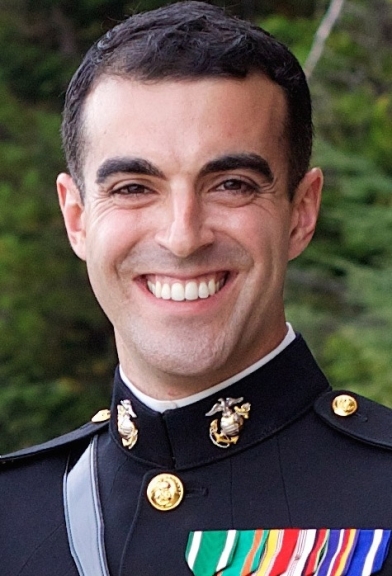Anthony Garofano ’04
Operational Law Attorney, U.S. European Command

Classics
Operational Law Attorney, U.S. European Command
“Studying classics has been crucial in how I understand the motivations and decisions of our culture and government today.”
What have been your key milestones since graduating from Middlebury?
Deploying to Afghanistan with an infantry battalion and being in combat has been one of the most significant milestones by far. Similarly, commanding a company of more than 400 Marines and my current job in the House have been major career highlights. Finally, in 2012 I was named the American Bar Association’s 2011-2012 Outstanding Young Military Lawyer for the United States Marine Corps and that was a positive experience. On the personal side, I got married last summer and we are expecting a child this fall. While not career related, that’s a pretty big change that I am very excited about!
How has the classical studies major influenced your life after graduation?
Obviously, the world of 2015 is vastly different than that of Pericles or Augustus but the glories, tragedies, advancements, horrors, success, and failures of their times have a massive influence on our own culture and democracy. The neoclassical architecture of the buildings I work in everyday are a constant reminder of that. I do not know how I would look at or consider that influence today if I had not studied the Classics for four years, but it is a crucial part of how I understand the motivations and decisions of our culture and government today.
It has also been, perhaps surprisingly, extremely relevant to a military career. The Commandant of the Marine Corps has a reading list for every rank and many of those books are histories of the Classical Era. For instance, I have studied Alexander the Great’s logistical operations as he conquered much of the known world and the pleasure of such reading is certainly multiplied by the appreciation for that era gained at Middlebury. My choice of non-assigned books has also been greatly influenced by my Classical Studies major. Purchasing a book based on little beyond the author’s ancient Greek or Latin name is an occasional vice.
How have the skills, knowledge or dispositions you learned as a classical studies major translated into your career?
A basic Marine rifleman needs to shoot, move, and communicate. A Marine Officer needs to do that plus plan and lead. And a Marine Judge Advocate needs to do all that plus research cases, write briefs, argue before fellow officers, and, in a deployed environment, speak intelligently about law of armed conflict and rules of engagement while under intense time pressures and, occasionally, enemy fire. (That list of requirements may be a bit biased in favor of my specialty… . ) I may not have learned to shoot and move at Middlebury, but the research, writing, and analytical skills learned as a Classical Studies major are second to none. I went to law school and into active duty very confident in those skills after four years at Middlebury and have found that confidence justified at every turn. When I talk to peers about how they were challenged as undergraduates, very few were asked to do nearly as much as we were at Middlebury and even fewer were held to as high of standards.
When did you know you wanted to be a Classical Studies major?
I took an introductory history of Classical Greece with Professor Jane Chaplin the very first semester I was at Middlebury. I loved it and her. I then took nearly every class she taught and quickly snapped up every other course the Classics department offered that I could. Suddenly I was a junior and, though a declared history major, only a few language classes away from completing a Classical Studies major. At that point, it only seemed right to double major. And though I will not pretend to have been any good at Greek, I am very glad I did double major.
Did you know what career path you wanted to pursue after graduating?
I did after the summer of my sophomore year; prior to that I had absolutely no idea. I went to Marine Corps Officer Candidate School in the summers after my sophomore and junior years and had earned a commission after that second round of OCS. I did not decide to try and become a Judge Advocate and go to law school until my senior year. Perhaps my Roman Law class influenced that.
Finally, what advice or suggestions do you have for current classics majors as they consider their post-Middlebury futures?
Keep a truly open mind. I never would have imagined myself in the military, far less a Marine Officer, as a first year student at Middlebury but I would not change a thing today!
Connect with Anthony in Midd2Midd.
Learn More About the Classical Studies Department at Middlebury

